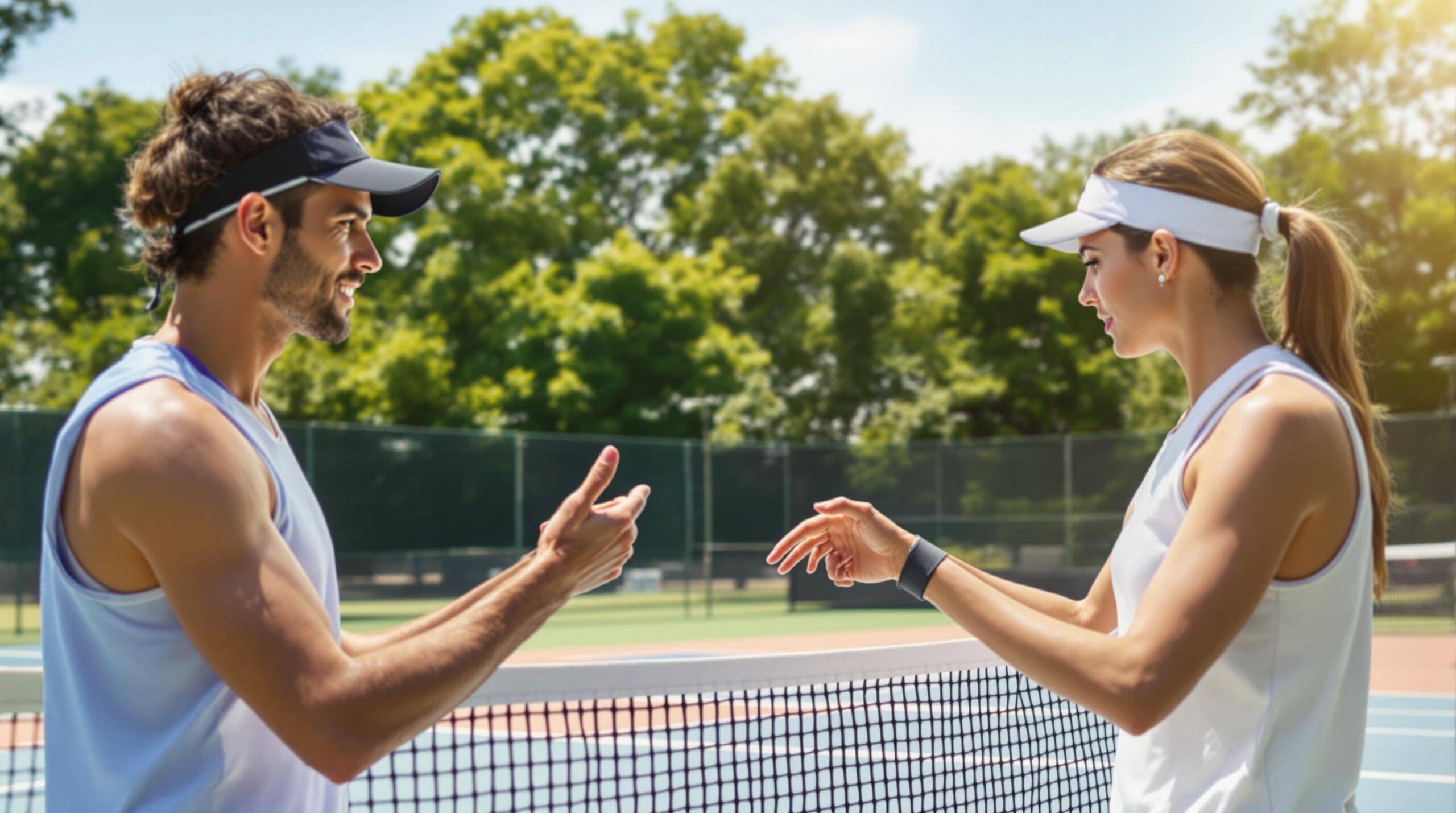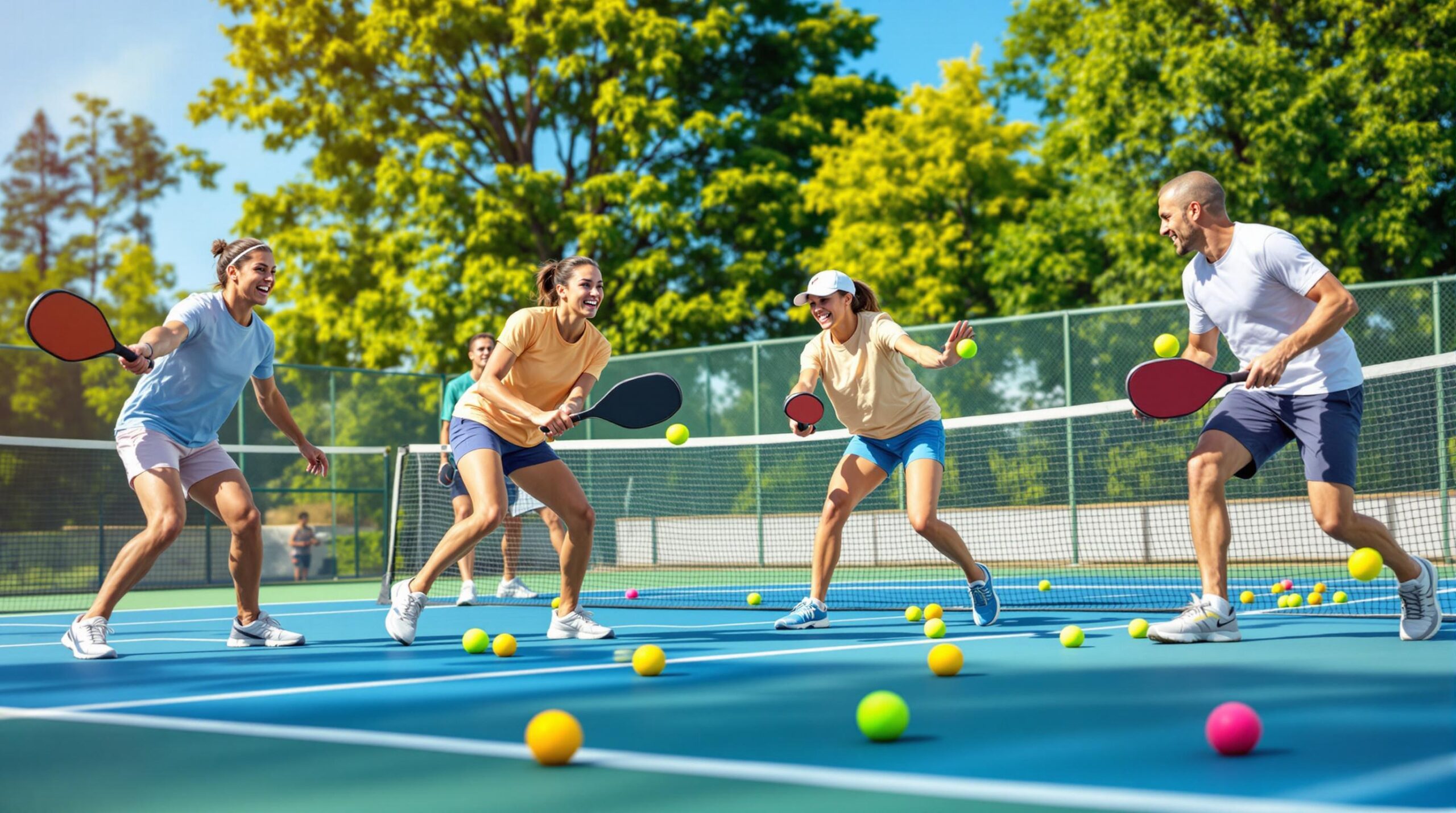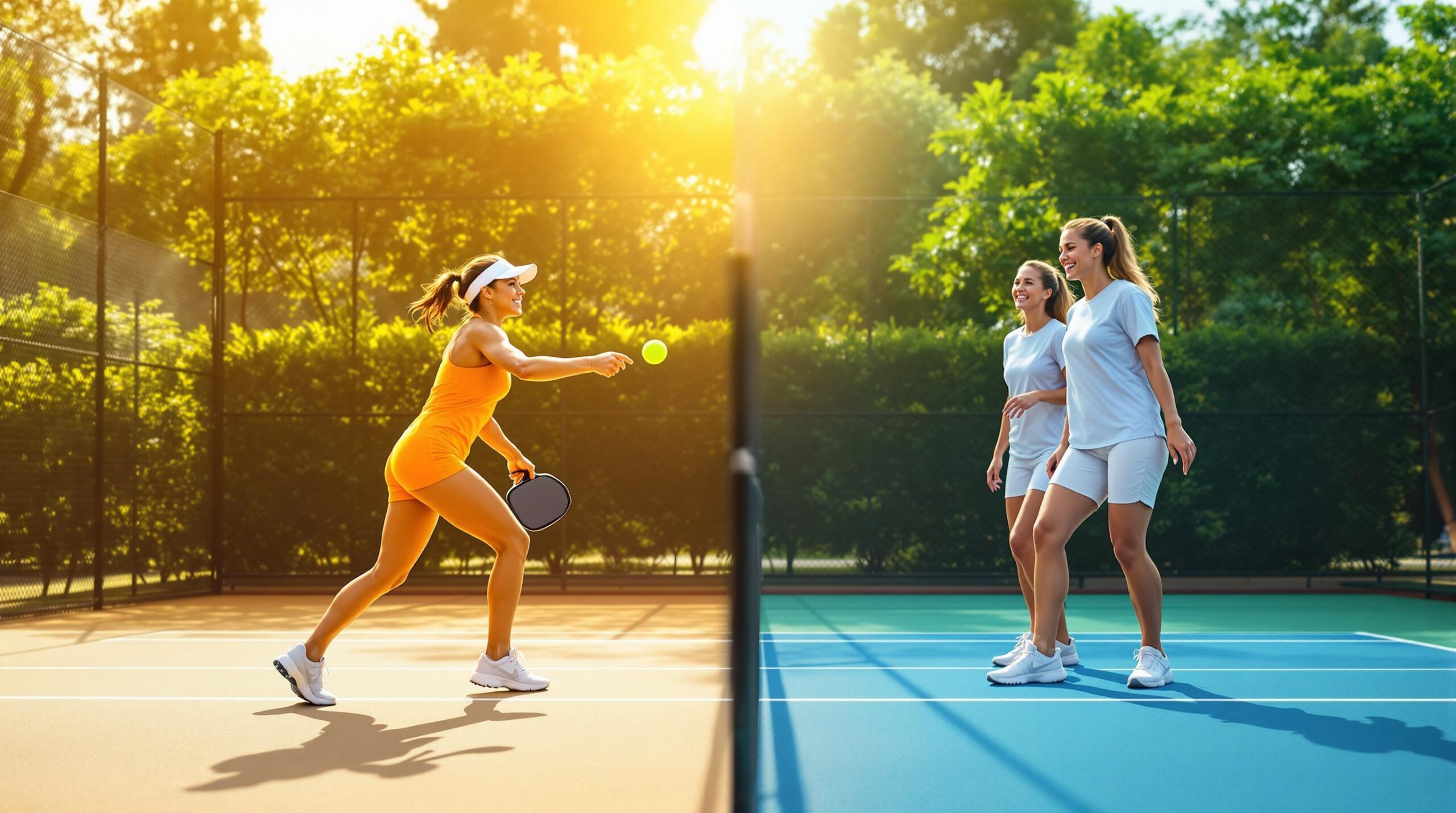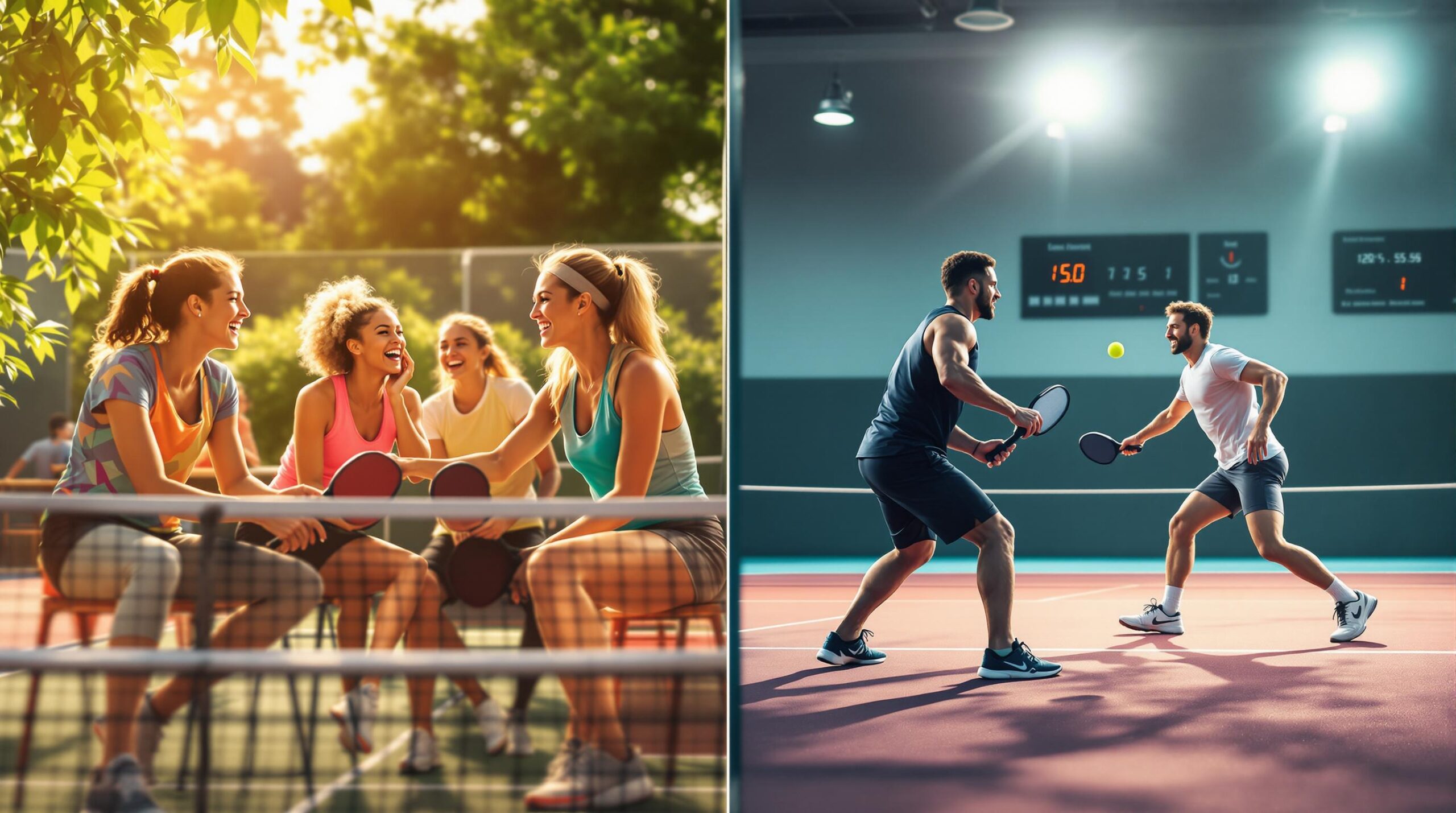When joining a pickleball league, you’ll need to decide: solo or partner registration. Each option offers unique benefits based on your goals, schedule, and playing style. Here’s what you need to know:
- Solo Registration: Play with different partners each week. Ideal if you value flexibility, want to meet new players, or focus on personal skills.
- Partner Registration: Play with the same teammate all season. Best for building teamwork, refining strategies, and consistency.
Quick Comparison
| Aspect | Solo Registration | Partner Registration |
|---|---|---|
| Partner Assignment | Changes by match or week | Fixed for the season |
| Schedule Flexibility | High | Requires syncing with partner |
| Social Experience | Meet and play with new people | Focus on one consistent partner |
| Skill Development | Adaptability and independence | Teamwork and advanced strategies |
Key takeaway: Choose solo to keep things flexible and dynamic. Choose partner for consistency and teamwork. Both options help you grow as a player – pick what fits your lifestyle and goals.
Solo vs Partner Registration Basics
Solo Registration Explained
Solo registration lets players join leagues without committing to a specific partner. To sign up, you provide your skill level and availability. The league then matches you with other solo players, including substitutes for when someone can’t make it.
You can also request to team up with a friend who registers separately. This option offers flexibility but adds an element of unpredictability to your league experience.
Partner Registration Explained
Partner registration, on the other hand, means signing up with a chosen teammate for the entire season. This ensures consistency, giving you and your partner the chance to build teamwork and refine your strategies together.
To register as partners, both players need to:
- Fill out registration forms
- Coordinate schedules
- Agree on the skill level division
- Pay the registration fee to confirm your spot
Here’s a quick comparison of the two options:
| Aspect | Solo Registration | Partner Registration |
|---|---|---|
| Partner Assignment | Changes by match or week | Fixed for the season |
| Schedule Flexibility | Based on your availability | Requires syncing with partner |
| Team Formation | League assigns teammates | Pre-arranged partnership |
| Backup Players | Provided by the league | Managed between partners |
| Social Experience | Play with a variety of players | Focus on one partnership |
Choosing between solo and partner registration depends on what you’re looking for. Do you enjoy meeting new teammates and mixing things up? Or do you prefer the consistency of playing with someone you know and trust? It’s all about what fits your goals for the season.
Comparing Registration Types
Solo Registration: Pros and Cons
Solo registration is ideal for players who value independence and flexibility. It works well for those with:
- Changing schedules
- Frequent travel commitments
- Interest in meeting new players
- A focus on personal skill development
Playing solo pushes you to cover the entire court, which can sharpen your shot accuracy, movement, decision-making, and defensive skills. However, the challenge lies in adapting to new partners regularly. While Paddle Party‘s system matches players by skill level, differences in playing styles and communication can make each game unpredictable.
On the other hand, registering with a partner offers more consistency and long-term strategic growth.
Partner Registration: Pros and Cons
Partner registration emphasizes teamwork and strategy. When you register with a partner, you can develop:
- Coordinated court coverage
- Strong communication habits
- Consistent game plans
- Reliable shot combinations
Playing with the same partner allows you to refine advanced tactics and master specific plays. It also helps you understand each other’s strengths and areas for improvement. However, there are important factors to consider:
| Aspect | Key Point |
|---|---|
| Schedule Alignment | Both players need to commit to regular play times |
| Skill Compatibility | Partners should complement each other’s abilities |
| Communication Style | Clear signals and strategy discussions are essential |
| Backup Planning | Have a plan for substitutes if a partner is unavailable |
The biggest challenge is dealing with your partner’s availability. To avoid disruptions, teams should:
- Communicate openly about schedules
- Set clear attendance expectations
- Plan for potential conflicts
- Maintain a positive attitude during tough matches
Ultimately, the choice between solo and partner registration depends on your playing style and priorities.
How to Choose Your Registration Type
Player Level and Goals
Your playing experience and objectives play a big role in deciding the right registration type. If you’re just starting out, solo registration is a great way to focus on the basics without the added pressure of working with a partner. It also gives you the chance to play with a variety of people, helping you learn from different styles.
For intermediate and advanced players, the choice depends on what you’re looking to achieve. Want to refine advanced tactics and work on specialized strategies? Partner registration offers the consistency you need. On the other hand, if you’re looking to test your ability to adapt to different styles, solo registration in higher divisions might be the better option.
| Skill Level | Solo Registration Focus | Partner Registration Focus |
|---|---|---|
| Beginner | Learning fundamentals | Gaining confidence with a teammate |
| Intermediate | Exploring varied styles | Developing consistent strategies |
| Advanced | Adapting to challenges | Perfecting advanced tactics |
Once you’ve considered your skill level, think about how your schedule and social preferences fit into the mix.
Time and Schedule Management
If you need flexibility, solo registration in Blind Draw Social formats is ideal. You won’t have to coordinate with a partner, which is especially helpful if you:
- Travel often for work
- Work irregular or rotating shifts
- Need the freedom to reschedule matches easily
Partner registration, while less flexible, provides more structure. It works best if you and your partner can commit to:
- Weekly match schedules
- Regular practice sessions
- Tournament dates (if applicable)
- Playoff commitments
Make sure you and your partner are on the same page about availability before committing to this option.
Social and Team Dynamics
Your personality and social preferences also matter when choosing a registration type. Solo registration in Blind Draw Social formats is perfect for players who enjoy meeting new people and expanding their network. It also allows you to:
- Play with different partners each week
- Connect with a wide range of players in the pickleball community
- Track your personal progress through individual standings
If you’d rather focus on building strong partnerships and teamwork, partner registration might be a better fit. This format lets you:
- Develop long-term playing relationships
- Build on teamwork and communication
- Work toward shared goals in a competitive setting
Think about whether you enjoy the variety and social interaction of solo registration or the consistency and deeper connections that come with partner registration. Extroverts often thrive in the dynamic environment of solo play, while those who prefer familiarity may feel more comfortable with a regular partner.
sbb-itb-b64fdb6
Making the Most of Your Choice
Tips for Solo Players
Once you’ve decided on your registration option, boost your solo play experience with these practical strategies.
Stay in a central position on the court to cover more ground and recover quickly during play. Between league matches, sharpen your skills by:
- Marking a line 7 feet from a wall to simulate the non-volley zone.
- Practicing dinks, drops, and drives by aiming at cones placed in specific areas.
- Keeping calm and mixing up your shots to keep opponents guessing.
Quickly adapt to new partners in temporary pairings by varying your shots and staying aware of court dynamics.
Tips for Partner Teams
If you’re playing with a partner, focus on teamwork by following these strategies.
Build strong communication and a clear game plan before, during, and after matches. Assign specific roles, like having one player focus on aggressive shots while the other sets up plays. This approach can improve coordination in critical moments.
Use signals for switching positions and choosing shots, manage middle court responsibilities effectively, and establish consistent serving and return routines.
"The important thing is that whomever your pickleball partner becomes, it’s a good idea if you treat him or her with the kind of respect, attention and care that allows your relationship to stay strong. In other words. Don’t be a jerk to your pickleball partner."
Regular check-ins and open feedback between you and your partner can help strengthen your teamwork over time.
League Registration without a Partner
Conclusion
Your registration choice plays a key role in shaping your league strategy. Solo registration focuses on personal strategy and court coverage, while partner registration highlights teamwork and tactical coordination.
Consider these factors when deciding:
- Physical fitness and stamina
- Preferred playing style
- Schedule flexibility
- Desire for social interaction
Each format hones different skills. Solo play enhances individual abilities, while partner play builds teamwork and strategic thinking. Success comes from committing to growth within your chosen format.
"The important thing is that whomever your pickleball partner becomes, it’s a good idea if you treat him or her with the kind of respect, attention and care that allows your relationship to stay strong. In other words. Don’t be a jerk to your pickleball partner."
Focus on mastering strategies that align with your registration type. For solo play, concentrate on court coverage and shot selection. For partner play, prioritize communication and coordination. Choose the format that best supports your current comfort level and long-term pickleball goals.






